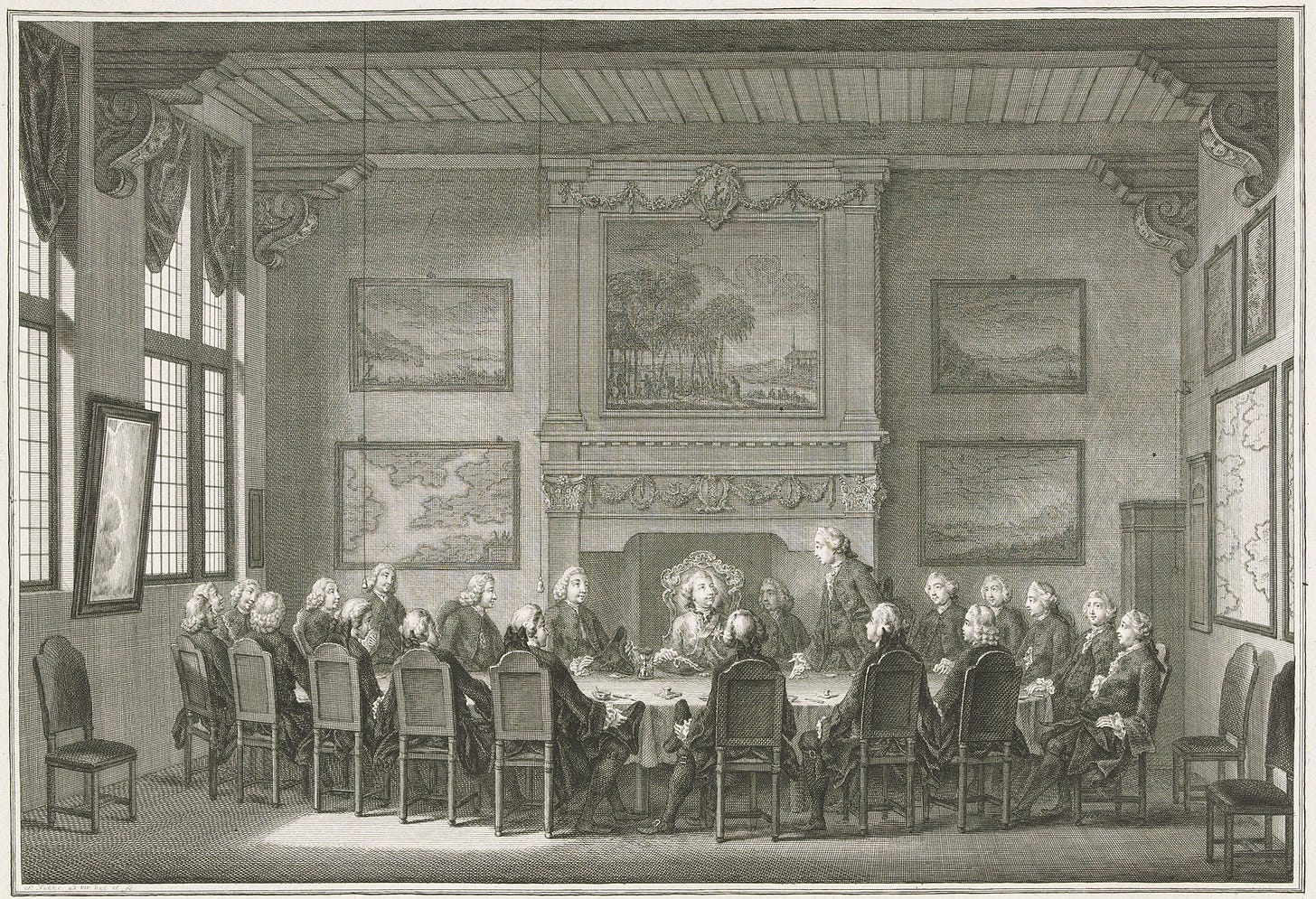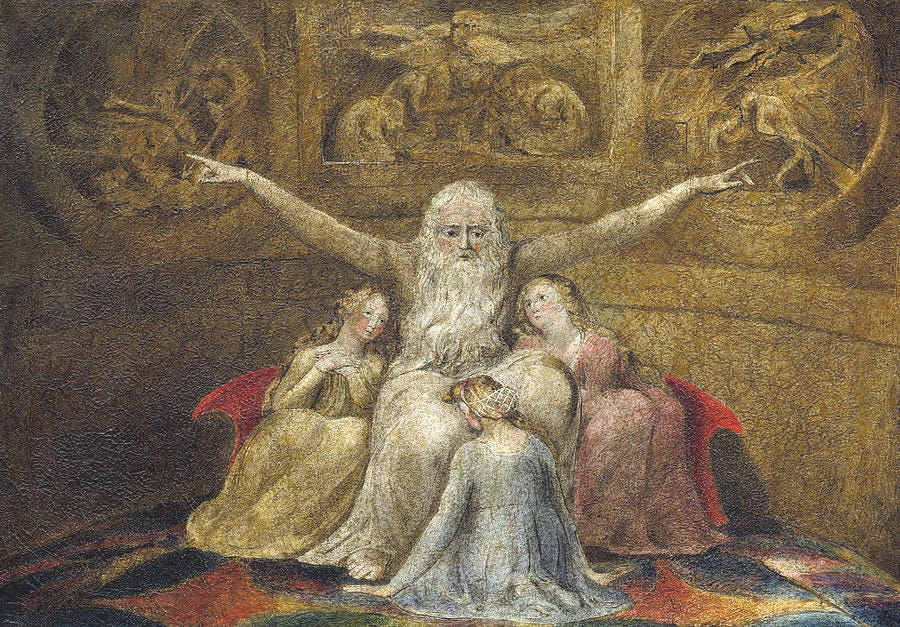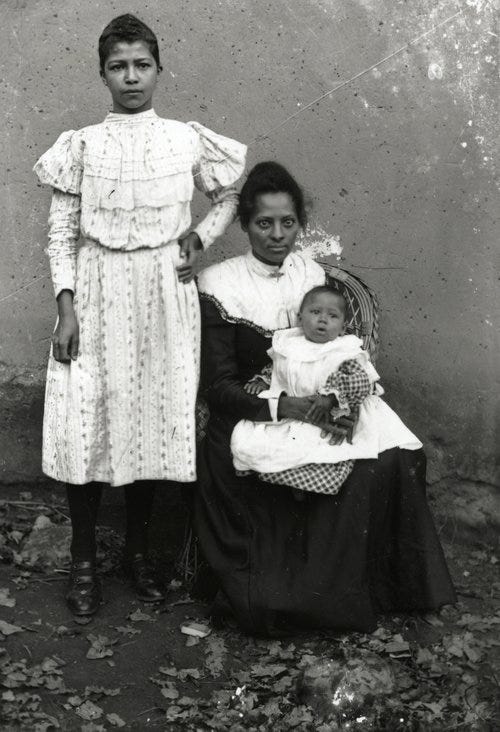Mason & Dixon - Part 1 - Chapter 7.1: Daughters of Job
Analysis of Mason & Dixon, Part 1 - Chapter 7.1: Arrival in Cape Town, Bonk, the VOC and the Eighteenth Lord, the Vroom Home, the Seduction Plot
The white man’s arrival in Africa has never presaged anything good. And here we are again.
For leagues, Mason and Dixon, still aboard the Seahorse, passing the mountains at Tenerife and onward toward the continent, had watched as “the unreadable Map-scape of Africa had unaccountably emerg’d” (58). South past Namibia where the Herero genocide would occur a little more than a century later,1 the ship arrived at the Dutch colony of the Cape of Good Hope — known today as Cape Town, South Africa.
The Cape of Good Hope, despite being a part of Africa and a long voyage from Europe, was run “by the sepia-shadow’d Herren XVII back in Holland,” (58) the seventeen leaders of the Dutch East India Company (VOC — or, the Vereenigde Oostindische Compagnie, but I’ll be referring to them as the VOC from now on). This is not a new colony either, for the Dutch had colonized South Africa over a century ago in 1652, so any living native of the Cape of Good Hope knows nothing except Dutch rule. This can all be pictured as such. Those whom the natives see as their ‘rulers’ are those who reside there: insane men and their families who treat this land as their ‘playground.’ Yet this is not where the rule begins. The Herren XVII of the VOC send down orders and proclamations from their high-ceilinged, opulent room, seated around a table in powdered wigs, controlling the lives of natives who are thousands of miles away in a land they likely have never seen. This room where the Herren XVII rule from is not dissimilar from the office at Twelfth House, where Pointsman, in his shadow-corner, passed down similar proclamations to colonies or sites to be destroyed (Gravity’s Rainbow, 4.2). And still, it did not end with these seventeen men, for even they were “rul’d by the Eighteenth Lord, whose existence must never be acknowledg’d in any way” (58). While the Herren XVII are the visible and crowd-facing leaders just as someone like our modern president, our congress, or the British parliament is, there are always bodies of power which cannot be seen — what would be known as Them in Gravity’s Rainbow, or the Elite elsewhere. Or, to define it, those who utilize their power to maintain the hegemony of these entities just as the pointsmen did for history.
Upon disembarking the ship, Mason and Dixon are immediately “accosted, by a man named Bonk, a Functionary of the V.O.C.” (58). Bonk gives them a series of rules to be followed while they are here at the Cape of Good Hope, stating that residing here maintains the same laws as residing upon a ship, where the captains of the ship (in this case, the VOC) command the sailors (in this case, Mason and Dixon) in order to ensure nothing goes too awry. An argument ensues between the lot with Bonk accusing them of arriving with intentions beyond that which they had stated — those being simply “to observe the Sky” (59). The VOC, via Bonk, is already worried that other entities are out there, ready to accuse them of crimes against humanity regarding the slave trade or whatever else they may be doing out here. Yet Mason and Dixon assure him that they really are only out here on the behest of their own king — their own ‘Eighteenth Lord.’ And as we know, the British surely have no issues with the slave trade. The VOC-man’s issue is not with the two of them, but with the British East India Company, a competitor with the VOC (the Dutch East India Company). Bonk’s paranoia regarding the two Astronomers is thus similar to two industries who may be competing within the same field, say: Coca-Cola and Pepsi or Boeing and Raytheon. The existence of one necessitates the decrease in profits of another. So, it is no surprise that Bonk is suspicious of the two, though his allowance of their coming proves that the common goal of both could benefit one another in the long run.
Mason and Dixon boarded with the Zeemann family, however, due to many of the Zeemann’s slaves deserting them, there were not enough hands on board to manage the necessities for both for the household itself and extra visitors. Therefore, Mason and Dixon only boarded with this family while spending most of their time dining and living with the Vrooms.
The fact that a family in this colony would not be able to properly function (that is, function according to their Western standards) without enough slave labor is a direct call to the exploitation of the worker and of the foreign laborer. As the colonies spread, as the desire for creature comforts and luxuries increased, and as the need for foreign goods continued to become more commonplace, it became clear that a certain level of exploitation whether it be wage theft or literal slavery would be necessary to maintain this standard.
The Vroom’s house was populated by “Cornelius Vroom, the Patriarch of this restless House-hold,” (60) his wife Johanna, and their three daughters, Jet, Greet, and Els. While these three daughters are very underage, they immediately take a liking to Mason and Dixon, fondling the two of them beneath the tablecloth leaving them coughing and blushing as Cornelius and Johanna pretended not to notice. And not only that, but when Mason leaves his room early one morning, running into Johanna Vroom on his way to breakfast, she looks at him with an equivalent lust and ‘Fascination’ as the daughters did. Mason is confused, not understanding how, having rarely been desirable to many due to “the Size of a certain Frontal Hemisphere […] over whose Horizon he can sometimes not observe his Penis,” (61) he is now one of the two most desired men on the continent. Sure, he lost some weight due to seasickness on the Seahorse, but it is not like all that much changed. Not to discount Mason’s appearance or demeanor, but clearly something is afoot. Before we get to that though, the thought of food and bodyweight brings us on one of Dixon’s next tangents.
He, being an Englishman — who do not typically have the most extravagant tastes in cuisine2 — has developed a taste for the more exotic foodstuffs and, more ominously, the exotic peoples. Because of this, he has been shunned and rendered untrustworthy to the Dutch colonizers. Two trains of thought can be followed with this thread — the problematic nature of the Dutch’s opinion of Dixon for these desires, and Dixon’s desire in and of itself. The Dutch finding Dixon untrustworthy because of this shows their realization that an appreciation of the people, culture, and food of the natives or the oppressed would lead to a possibility of sympathy toward those same people — and sympathy toward the colonized leads to no benefit for the colonizers. On the other hand, a newfound love for exotic foods increases a need for those foods; and it is not as if this need would be satisfied when the only possibility to attain these foods was to set out on a long and dangerous voyage to those colonized lands. No, that is bad enough, but once that desire continued to expand, the food and products of foreign lands would need to be multiplied, produced at cheaper rates, and shipped across seas to any and all who are willing to pay for them. The exposure to and desire of these products is therefore a turning point leading the world onward not only to capitalism or monopoly capitalism, but imperialism in the truest sense of the word. It is not, however, someone such as Dixon’s fault for desiring this food,3 because anyone who found a more flavorful and enjoyable cuisine would do the same independent of their political alignment or level of power. Instead, it is the fault of those who want to commodify and profit off of this desire by any means necessary.
As the Astronomers chart the stars in order “to establish the Station’s Longitude as nearly as possible,” (62) Cornelius introduces them more formally to his daughters, Jet, Greet, and Els — or as Cherrycoke initially names them, Jemima, Kezia, and Kerenhappuch, the three daughters of Job. In this biblical tale, Job is tested by God, put through trial after trial, and still, at the end, comes out with faith. God thus grants Job prosperity once again which includes these three beautiful daughters. Cornelius, thus, is characterized by the Reverend as believing he has been granted these daughters through whatever trials he believes to have endured but that “he hasn’t suffered nearly as much as he thinks he has” (Biebel, 36).4 It is often that the colonizers believe they have overcome some form of mortal turmoil, achieving all that they were destined to do while putting themselves in harm’s way, willing to risk their lives for the furtherance of their people and thus their God. However, what God would desire that which the colonizers do, be that slavery or even the smallest act of exploitation? And further, would someone as Godly as Job have done what is soon to be done with his three daughters?
Their real names, as previously stated, are Jet, Greet, and Els. Jet, the oldest at sixteen years old, is plagued by vanity. Greet, the middle daughter (age unstated but is between thirteen to fifteen), is a bit more self-conscious but also acts as the mediator between the two other daughters. Els, the youngest at twelve, has devoted her life to love, though like Bianca (Gravity’s Rainbow, 3.14 & 3.15), this love has been perverted by that which she has been exposed to in the world around her, leading her to seek out men twice her age. Any caring or halfway ethical parent (or person for that matter) would not approve of such actions, yet Cornelius only seems to mind when it ends up being a “Lust that crosses racial barriers” (62-63). And not only that, but also when Els (or any of his daughters) expresses the slightest interest in the food of the native people, thus leading to that mentioned possibility of sympathy, he cannot bear it. He would rather pimp his daughters out to older white men than have the slightest possibility that they may develop sympathy or love for a native. It is because he feels surrounded on all sides: the unknowability of the African interior on one side, and the depth and mystery of the sea on the other. His sole solace is this Cape of Good Hope, where things seem as they did at home.
Mason is thus put upon by the girls. Jet makes the first move and Greet lets off some innuendos and euphemisms to Mason that Jet’s brush could be used as a bit more than a brush. And while Mason is quite turned on by these brushings and possibilities, Johanna comes in to put a stop to things. Surprisingly, just as at the dinner table, it does not appear like she is all that perturbed with what may have happened (not that Mason, however turned on, was about to actually act on any sexual desire).5 She does tell him he should not act on his urges but simultaneously tries to titillate him without him becoming too suspicious.
The purpose behind all of this sexual arousal is then revealed. Later that night, Austra, a slave, wakes Mason in his sleep. She is naked and explains to him that the girls’ and Johanna’s sexual stimulation of Mason was to basically just make him horny enough so he could not turn Austra down, leading to their copulation and the subsequent birth of a lighter skinned slave who could be sold on the market for an upcharge given they would not be as dark-skinned. To observe this all, we must first look at the belief system of the colonizers regarding skin and race. Just as with our modern-day bigots, skin pigmentation represents purity and worth as a human — that is, in the modern day, but back in Mason and Dixon’s time, the very concept of ‘humanity’ was even negotiable. Purity and worth, however, were not. Therefore, a lighter skinned slave would be viewed as more desirable due to (what they would say) being closer to the purity and worth of a white man while still being exactly as exploitable as the darker skinned Africans. If the colonizer viewed their own kind as more intelligent and formidable, then they would desire these traits to be passed down to future slaves. Even more disturbingly, the lengths at which they are willing to stoop to include the pimping out of one’s children (i.e. increasing the vulnerability and stripping away the innocence of children in order to rake in a profit and prove a point by further subjugating the other) and the objectification of one’s wife (i.e. thinking of the wife as property, which is further backed up when Austra states that White Wives serve the purpose of their own ‘master’ just as the slaves do). Therefore, the entirety of this project that has been set out is run by Cornelius, completely objectifying the women in his life to produce profit on the sale of people. One could imagine Tenebræ, our future early feminist, becoming at least partially radicalized by the insanity of this part of the story alone.
The unfortunate point is that these trends have not entirely disappeared. While slavery of this more explicit and visible sort has largely gone away, America and the West is still attempting to ‘purify’ their nations, rendering us whiter and whiter by the year while still holding onto some type of person who our Elites consider lesser that we can subjugate to our will. To do this, our children must be stripped of innocence and indoctrinated in the same ideology that led to these beliefs in the first place, and our women — or whichever groups we consider lesser given the situation at hand — must be willing to give themselves up for the same cause. Women and children will thus be forced to give up their own freedoms in order to protect those of the Elite. And that is not to say that men will go wholly unaffected by these issues, it is just that the current observation is that of the families of the Elite. Our working-class families will not be seen until later.
Thankfully, and one could technically say honorably though that is debatable, Mason does not give in. This does not change the fact that over the coming days, repeated attempts will be made in private and public. The coming capitalist imperialist age will prove that just as with this scene, the field will shift “from Motives of Pleasure to Motives of Reproduction and Commerce” (66) — reproduction being the only thing that can keep the profit train moving eternally onward. So, while this colony’s initial formation may have been solely for the playground-like nature of said colony, things always revert back to where the profit lays. One is not necessarily more nefarious than the other, but the fact remains that they go hand in hand.
Up Next: Part 1, Chapter 7.2 (to the end of the chapter)
This genocide is explored heavily in Gravity’s Rainbow (specifically in 3.3 and 3.5, but a good amount throughout the rest of the novel as well) and in V. (Chapter 9).
See the Disgusting English Candy Drill in Gravity’s Rainbow (Gravity’s Rainbow, 1.15).
Pirate Prentice’s banana breakfast shows that this desire continues long into the future, creating a market for these products of colonization via multinational corporations such as the United Fruit Company (Gravity’s Rainbow, 1.2).
Biebel, Brett. A Mason & Dixon Companion. The University of Georgia Press, 2024.
This is reminiscent of Slothrop, who did act upon his sinful urges (Gravity’s Rainbow, 3.15). While Mason has similar urges, thus signifying he wishes to join a higher rank through their form of trial via perverted blackmail, he does not act on them in the same way Slothrop did.









This chapter gives me a "playground rules" vibe. I've almost finished M&D, but you bet I'll be re-reading as you move along. Thanks as always.
Impressive you are able to consistently write these summaries, along with your own commentary, on such a regular schedule. Thank you.